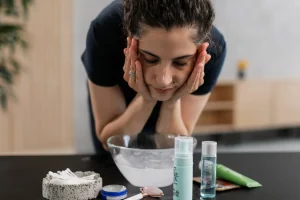The Role of Stress in Acne Breakouts
3 min read
Stress can contribute to acne breakouts, so it is wise to try and decrease it wherever possible. A healthy diet, skincare routine and adequate rest may all play a part in this effort.
Stress plays an integral role in acne breakouts, and we offer recommendations that can ensure its long-term wellbeing.
Increased Sebum Production
If you have oily skin, blemishes can appear when your body produces too much oil which combines with dead skin cells to clog hair follicles and form pimples. Stress hormones increase oil production further exacerbating acne issues.
“Stress increases cortisol levels, which triggers our sebaceous glands to increase sebum production,” according to dermatologist Shereene Idriss in a TED Talk. Clogged pores become more vulnerable to infection, potentially leading to inflammation that manifests as acne breakouts on forehead, nose and chin areas; stress acne typically appears on these spots characterized by increased inflammation that often turns into painful cystic acne breakouts.
There are various strategies available for managing stress that can help to decrease breakouts, such as meditation, yoga, prayer and exercise. Also eating low-glycemic food while restricting dairy and sugary snacks as well as remaining hydrated while cutting back your schedule can all help regulate hormones and reduce cortisol levels.
Increased Inflammation
Inflammation is your body’s way of protecting itself against harmful organisms like bacteria. White blood cells and other defense mechanisms move into an area to catch any offending organisms or neutralize them with antibodies.
Your pores become clogged with dead skin and sebum when they become blocked with debris, prompting an immune response that leads to inflammatory acne lesions that are red, swollen and painful to the touch. They include papules (pimples) and pustules that appear directly on the surface skin as well as deeper cysts which may leave permanent scarring behind.
Inflammation is at the core of inflammatory acne, but other factors can exacerbate it. Fluctuating hormone levels during puberty and pregnancy, for instance, may increase androgen levels which in turn causes sebum production. Other risk factors may include genetics, oily skin and medications like corticosteroids or lithium. Diet may also play a part – eating balanced meals with a low glycemic index can help decrease skin inflammation.
Changes in Hormones
Hormonal fluctuations among girls and boys often lead to an increase in androgen levels that cause sebaceous glands to enlarge, which in turn stimulates more oil production by the skin, leading to further oily patches on its surface and increasing oiliness across its entirety. When combined with bacteria found in hair follicles, acne is formed.
Acne can range in severity from mild to severe. Mild forms typically include whiteheads and blackheads that don’t necessitate medical intervention, while inflammatory lesions such as papules, pustules and cysts require medical care for diagnosis and treatment. Severe forms often involve widespread lesions which leave permanent scars behind.
Hormonal fluctuations during pregnancy, menstruation, and perimenopause can also trigger acne breakouts. For instance, during the first trimester of gestation, rising levels of progesterone hormone can cause pores to become blocked with oil and dead skin cells that clog them.
Steps can be taken to balance hormones and reduce hormonal acne, such as avoiding foods with a high glycemic index which help control blood sugar and reduce inflammation, or taking supplements containing salicylic acid which help clear away blocked pores.
Disruption of Healthy Habits
Many people who believe they eat healthily and take good care of themselves still find themselves suffering from acne. It may be because what people consume has both immediate and long-term impacts on their bodies; certain foods could trigger acne breakouts while others could help protect against it.
Dairy products such as milk and cheese may increase your risk of acne because they trigger a sudden surge in blood sugar levels, potentially leading to inflammation that will increase sebum production further. Studies indicate that eating lower glycemic foods like vegetables or green tea could actually help improve acne conditions.
Washing your hair frequently and keeping it clean may help prevent acne by eliminating excess oil, while other seemingly healthy habits could actually be contributing to breakouts; too much caffeine, for instance, can irritate skin while stimulating cortisol release; using dirty phones or sleeping on unclean bedding could introduce bacteria that clogs pores leading to breakouts.






